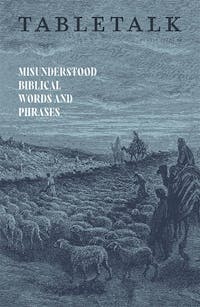
Request your free, three-month trial to Tabletalk magazine. You’ll receive the print issue monthly and gain immediate digital access to decades of archives. This trial is risk-free. No credit card required.
Try Tabletalk NowAlready receive Tabletalk magazine every month?
Verify your email address to gain unlimited access.
It’s frustrating when things don’t work as they’re supposed to. You rummage through the junk drawer to get batteries for the remote, only to find that they have no charge, despite not being expired.
This futility gives us an idea of what the Bible means when it speaks of vanity. Vanity is a wisdom concept found in both the Old and New Testaments that points us to what will work and what won’t. It serves as a warning label from God to help us discern what is real, lasting, effective, and of value, as opposed to what is empty, futile, meaningless, and fleeting. The Old Testament book of Ecclesiastes specializes in the subject of vanity, bringing application to just about every area of life under the sun where we might try to find meaning in this fallen world. Its descriptions of frustration and ineffectiveness resonate with our experience.
As a wisdom concept, vanity is intended to keep us from seeking meaning, purpose, and value in what will only disappoint. It reflects the proverb, “There is a way that seems right to a man, but its end is the way to death” (Prov. 14:12). Wisdom, however, not only helps us discern vanity; it directs us to where we can find the life we seek. After a comprehensive survey of vanity, Ecclesiastes lays out the operating principle to a meaningful life: “The end of the matter; all has been heard. Fear God and keep his commandments, for this is the whole duty of man” (Eccl. 12:13). In other words, rather than relying on what seems right to us or buying in to the counsel of the world, we lift our eyes beyond the created order to give ear to our Creator. Upon hearing, we put into practice what He says, forming our opinions, directing our steps, and placing our trust in Him and His revealed will. The fear of the Lord is the beginning of wisdom.

We find this operating principle in God’s call through the prophet Isaiah, where He contrasts the bread that does not satisfy with the rich food that He provides (Isa. 55:2–3). Without the fear of the Lord that gives ear to Him as God, we are in danger of entrusting ourselves to the vanity of what will only disappoint. The contrast of vanity versus verity, of what is vain as opposed to what is of value, provides the dividing line between wisdom and folly throughout Scripture. We see this in terms of where we look for truth and what we rely on for life.
When Paul and Barnabas brought the gospel to Lystra in the book of Acts, they urged the people to “turn from these vain things to a living God, who made the heaven and the earth and the sea and all that is in them” (Acts 14:15). What were these vain things? The people had made their own gods and followed their own inclinations. In labeling it all vain, Paul and Barnabas were saying, “It won’t work.” Rather, the people were to repent of their own devices and turn to seek and serve the living and true God (see Ps. 31:5–8; 1 Thess. 1:9–10).
It is as we give ear to the creator God that we are directed away from the futile ways that seem right to us to the fertile way that yields life. Ultimately, that way is God’s provision in Jesus Christ, in whom are found life authentic, abundant, and eternal.
The Apostle Paul expresses the salvation of God in Christ in terms of vanity. In explaining the effectiveness of Christ’s work, he explains: “And if Christ has not been raised, then our preaching is in vain and your faith is in vain. . . . And if Christ has not been raised, your faith is futile and you are still in your sins. Then those also who have fallen asleep in Christ have perished” (1 Cor. 15:14, 17–18). But Christ has been raised. Our faith is founded. Our hope is not empty. Our life in Christ is not meaningless. Our labor in the Lord is not in vain.
